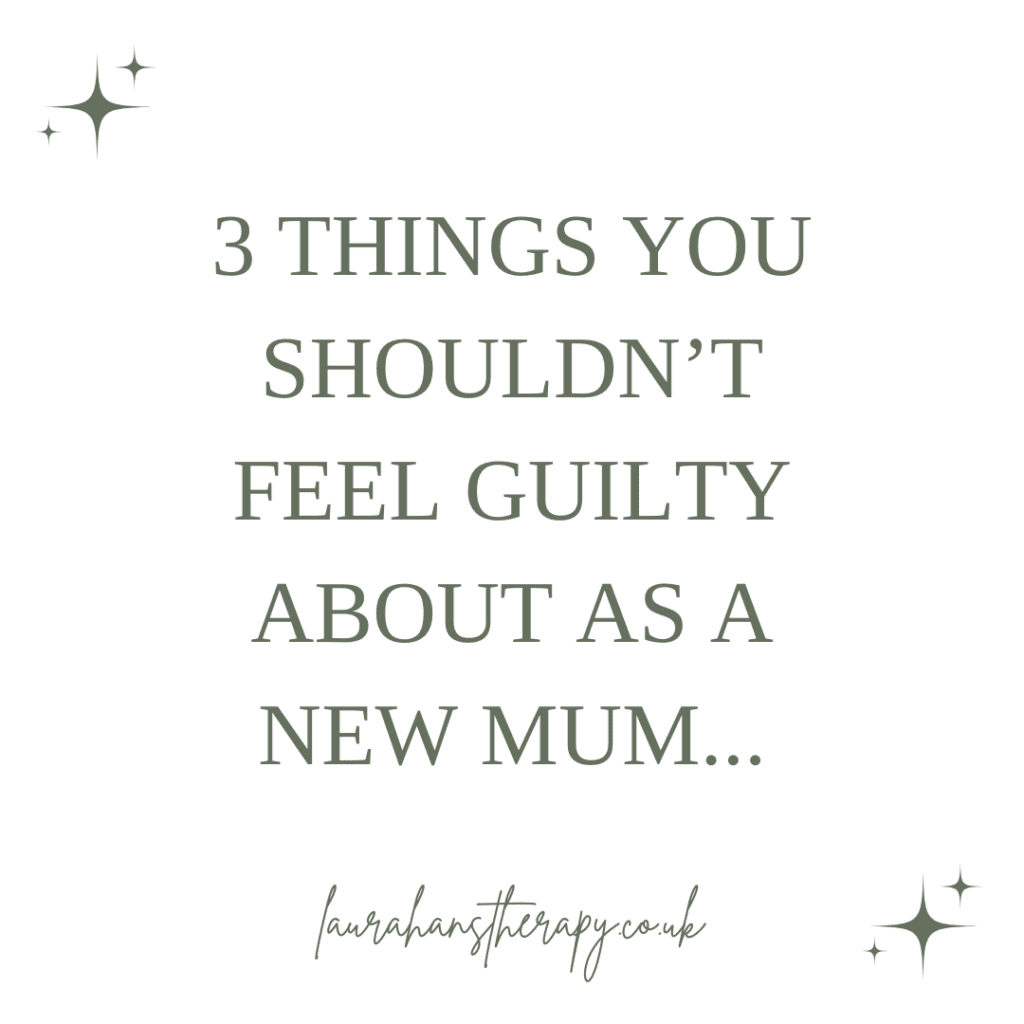I think most of us are familiar with the term ‘mum guilt’, the name given to the feelings of guilt women experience in relation to their children. I’m yet to meet a mother who hasn’t experienced it to some degree.
I believe new mums are particularly susceptible to guilt. To counteract this, I’d like to explore some common perceived failures and struggles associated with becoming a mum and the newborn phase more generally. These are three things I firmly believe you shouldn’t feel guilty about as a new mum…
What Can Self-Compassion Tell Us?
Before we dive in, I want to remind you that self-compassion is a powerful antidote to guilt. If you’re feeling like a bad mum, ask yourself what you’d say to a friend in the same position? Would you encourage them to feel guilty and bad? Or would you help them see all the ways in which they’re good enough? What advice would you give them? Try to show yourself the same compassion and understanding.
Becoming a mother, whether it’s for the first time or the fifth, can bring up many emotions. It can also be a time when we feel isolated and alone, leaving us fragile and vulnerable. Self-compassion is a beautiful gift we can give ourselves, helping to reduce anxiety and depression while also increasing confidence and resilience.
As we work through my list below, we’ll reframe each struggle or perceived failure in a gentle, compassionate way. You can also download my free Learning to Love Yourself guide for more tips and strategies.
3 Things You Shouldn’t Feel Guilty About as a New Mum
-
What Your Birth Was Like
I work with a lot of mums who have experienced a difficult or traumatic birth, and they often blame themselves. They carry guilt about not being strong enough to cope without pain relief or believe they failed because they were unable to have a vaginal delivery.
Self-Compassion Tells Us…
Rather than blaming yourself, consider other external factors involved in your experience. For example, many would argue the maternity system here in the UK is broken, forcing us to give birth under the care of overstretched midwives who are unable to provide the compassionate, loving care they trained for.
We also live in a time of increased medical intervention. Rather than allowing birthing people to trust their bodies and their babies to arrive when they’re ready, we’re encouraged to speed up the process, increasing our likelihood of medical interventions such as forceps and caesarean. Read Coping with Birth Trauma for more on this.
-
How You Feed Your Baby
Most who’ve experienced it would agree – breastfeeding is hard. Although there are numerous ways to feed and nourish your baby, struggling or being unable to breastfeed can be a huge source of guilt. Again, many mothers blame themselves and feel like they’ve failed if they’re not able to sustain breastfeeding their baby.
Self-Compassion Tells Us…
You need to consider those external factors again! Instead of blaming yourself, think about the lack of feeding support and the contradictory information we’re given. I talk about this in more detail with lactation consultant J’Nel Metherell in Breastfeeding Grief & Trauma.
You can also read How to Look After Yourself If You’re Unable to Breastfeed for more guidance and support.
-
Not Being Able to Maintain Your Usual Standards
Postnatally, many new mums find it difficult to maintain the standards they set for themselves prior to having a baby. This is especially true of first-time mums who have always had high standards for themselves at work and at home. When these standards become unachievable because they aren’t consistent with having a newborn, it can quickly lead to feelings of failure.
Some mothers struggle to ask for help, believing they should be able to cope on their own because they’ve always done so in the past. When they find they can’t, guilt sets in.
Self-Compassion Tells Us…
Try to identify what your self-imposed standards and expectations are and whether they are helpful in your life right now. We all have expectations. Those that are healthy, balanced and flexible can be beneficial for us and our mental health, but rigid, unrealistic standards can do more harm than good.
Remember, you’re in the fourth trimester, a period of massive physical and emotional change. While your baby is adjusting to being outside the womb, you are adjusting to life as a new mum (or, in subsequent pregnancies, mum to more children). Did you know babies are likely to cry more in the first 12-weeks after birth than at any other time? As well as obvious challenges like sleep deprivation, birth and/or perinatal trauma can make the fourth trimester even more difficult to navigate. Any expectations you have for yourself should reflect these things. Read How to Survive the Fourth Trimester to learn more.
Nurturing You Through Motherhood
If you’re struggling with your motherhood journey for any reason and it’s affecting your mental health, I can help. Reach out for support by booking a consultation here or subscribe to The Nurture Toolkit for free, actionable tips and prompts straight to your inbox. I also share lots of encouragement and support via Instagram.
Useful Links
Mum Guilt – What to Do When You Feel Like a Bad Mum
How Self-Compassion Can Help You Parent
How to Stop Blaming Yourself as a Mum
